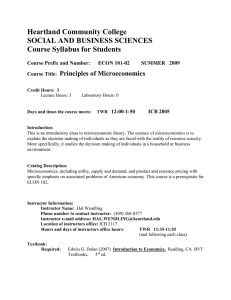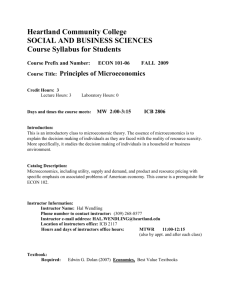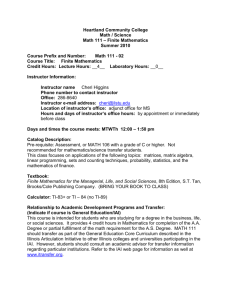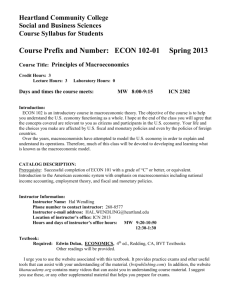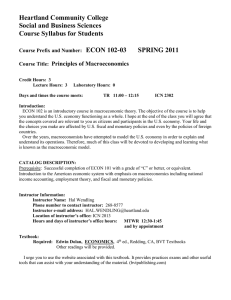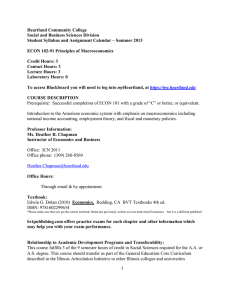ECON 102 -03 Wendling SP 10
advertisement
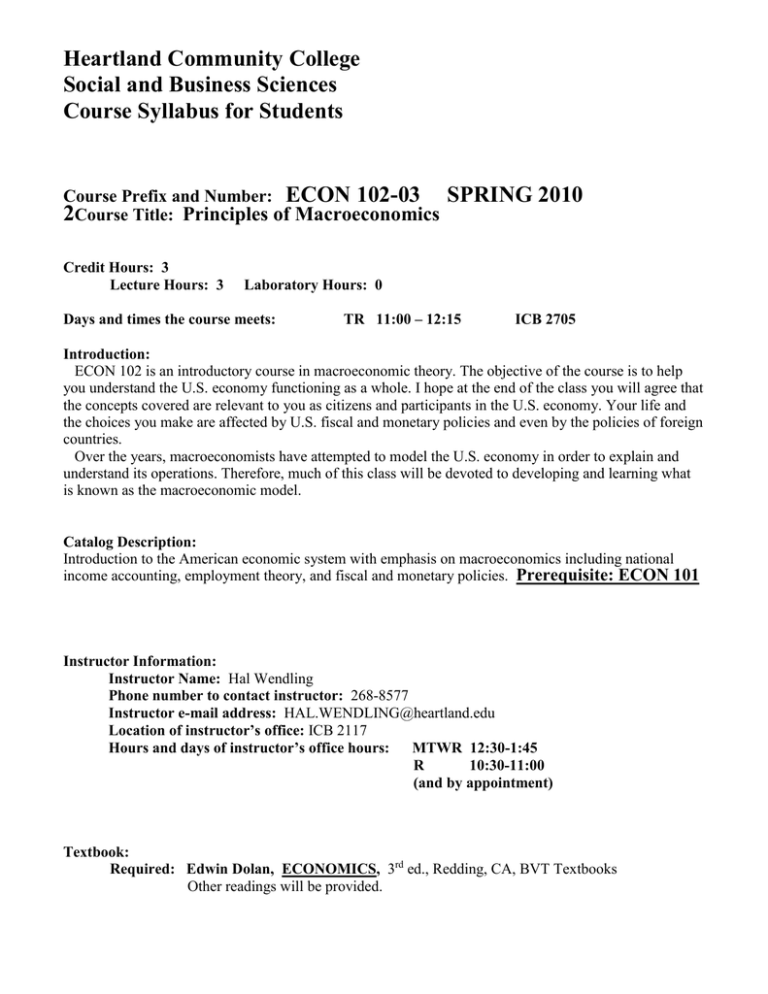
Heartland Community College Social and Business Sciences Course Syllabus for Students Course Prefix and Number: ECON 102-03 2Course Title: Principles of Macroeconomics Credit Hours: 3 Lecture Hours: 3 SPRING 2010 Laboratory Hours: 0 Days and times the course meets: TR 11:00 – 12:15 ICB 2705 Introduction: ECON 102 is an introductory course in macroeconomic theory. The objective of the course is to help you understand the U.S. economy functioning as a whole. I hope at the end of the class you will agree that the concepts covered are relevant to you as citizens and participants in the U.S. economy. Your life and the choices you make are affected by U.S. fiscal and monetary policies and even by the policies of foreign countries. Over the years, macroeconomists have attempted to model the U.S. economy in order to explain and understand its operations. Therefore, much of this class will be devoted to developing and learning what is known as the macroeconomic model. Catalog Description: Introduction to the American economic system with emphasis on macroeconomics including national income accounting, employment theory, and fiscal and monetary policies. Prerequisite: ECON 101 Instructor Information: Instructor Name: Hal Wendling Phone number to contact instructor: 268-8577 Instructor e-mail address: HAL.WENDLING@heartland.edu Location of instructor’s office: ICB 2117 Hours and days of instructor’s office hours: MTWR 12:30-1:45 R 10:30-11:00 (and by appointment) Textbook: Required: Edwin Dolan, ECONOMICS, 3rd ed., Redding, CA, BVT Textbooks Other readings will be provided. Relationship to Academic Development Programs and Transfer: (Indicate if course is General Education/IAI) This course fulfills 3 of the 9 semester hours of credit in Social Sciences required for the A.A. or A.S. degree. This course should transfer as part of the General Education Core Curriculum described in the Illinois Articulation Initiative to other Illinois colleges and universities participating in the IAI. However, students should consult an academic advisor for transfer information regarding particular institutions. Refer to the IAI web page at www.itransfer.org for more information. Beliefs: Academic Discipline: Economics. Student Learning: Responsibility shared with instructor. Instructor’s Role: My full-time job is helping you in the educational process. That means I am available to talk to you about this course or anything else that directly or indirectly concerns your education at Heartland. If you need help or have concerns that can’t be handled in class, then see me after class, during my office hours, or make an appointment. Don’t let yourself fall behind. Course Objectives (Learning Outcomes): Upon successful completion of this course, students will be able to: 1. 2. 3. 4. 5. 6. Demonstrate a knowledge of the concepts of scarcity, choice, and efficiency. Demonstrate a knowledge of the role of the government in the U.S. economy. Demonstrate a knowledge of the economic consequences of unemployment and inflation. Demonstrate a knowledge of aggregate demand and aggregate supply, as well as U.S. fiscal policy. Demonstrate a knowledge of fiscal policy and how it affects national employment and output. Explain some shortcomings associated with fiscal policy, and describe how fiscal policy impacts the federal deficit and the trade deficit. Demonstrate a knowledge of the U.S. banking system and monetary policy. Course/Lab Outline: The following topics are to be covered during the instructional process: I. II. III. IV. V. VI. VII. VIII. IX. X. XI. XII. Introduction to Economics Real GDP Unemployment Inflation Macroeconomic Theory Measuring Macro Variables Spending Allocation Model Productivity Money Economic Fluctuations Monetary and Fiscal Policy Trade and Global Markets HCC Portal Just a reminder that to access WebCT, IRIS, and your Heartland Student Email, you will need to log into myHeartland, at https://my.heartland.edu. Methods of Instruction: The class will primarily operate with a lecture/discussion format. These will be relatively heavy use of overheads and possibly some videos. Although class participation is not graded, student participation in questions and discussions is designed to prepare you for the exams. Whether you participate orally during class is up to you. Whether you participate mentally will play a significant part in your learning the material and thus, your grade. Course Policies: Method of Evaluation (Tests/Exams, Grading System): Exam #1 Exam #2 Exam #3 Exam #4 Final Paper TOTAL 100 points 200 points 200 points 200 points 250 points 50 points 1000 points A – 880-1000 B – 775-879 C – 670-774 D – 550-669 F < 550 Participation (or Attendance): Students are expected to attend all classes and participate meaningfully in the activities each class day. Absences will be penalized at the rate of 10 points each (after the first two (2) absences). Tardies will be penalized at the rate of 5 points each (after the first tardy). Students with perfect attendance will receive bonus points. (Remember: Class begins at 11:00, not 11:01.) I don’t distinguish between excused and unexcused absences. Incompletes: Only given under extraordinary circumstances. This is solely at the discretion of the instructor according to Heartland Community College Guidelines. Cancelled classes: Cancelled class sessions, for all HCC classes, will be listed under Cancelled Class Meetings in the AZ Index in the Current Student page on the HCC website. See www.heartland.edu/classCancellations Make-up of tests and assignments: NO MAKEUP EXAMS. You will receive a zero on any exam you miss unless you have an excused absence. If you are excused from an exam, the weight of the final exam will be increased by the point value of the exam you missed. This is not your choice! I will decide the validity of your excuse. Should you be excused from an exam you will have a short writing assignment that will have to be done satisfactorily or you will lose all the points for the exam. Required Writing and Reading: All written assignments are designed to enhance the student’s writing skills and critical thinking skills by analyzing concepts discussed in class. Students should read the required chapters, articles and reference material as indicated by the course calendar and assigned in class. Students are responsible for any and all material covered in class or in the readings. Student Conduct: Any form of cheating will not be tolerated. Lectures and class discussions may not be recorded. No eating or sleeping in class. (Severe penalties will apply). Students are responsible for all readings and information presented in class. * Turn off your cell phone. Cell phones cannot be used as calculators for exams. * No lap top computers * Each exam will have a time limit. If you’re late, you won’t be given extra time Academic Integrity Academic integrity is a fundamental principle of collegial life at Heartland Community College and is essential to the credibility of the College’s educational programs. Moreover, because grading may be competitive, students who misrepresent their academic work violate the right of their fellow students. The College, therefore, views any act of academic dishonest as a serious offense requiring disciplinary measures, including course failure, suspension, and even expulsion from the College. In addition, an act of academic dishonesty may have unforeseen effects far beyond any officially imposed penalties. Syllabi disclaimer: You will be notified of any changes to this syllabus. If an exam or assignment is due during a class period when class is cancelled, the new exam or due date is the next scheduled class period. Course Calendar: Chapters will be covered in order. Some chapters may receive only partial coverage. Additional material may be covered in class. Date Chapters Covered Exam #1 T 2/2 1-3 Exam #2 T 3/2 19-21 Exam #3 R 4/1 22-24 Exam #4 T 4/27 25-27 Paper T 5/4 FINAL T 5/11 10:00 (Review of basic economics) (Due by the end of class) All of the above plus + class lecture
